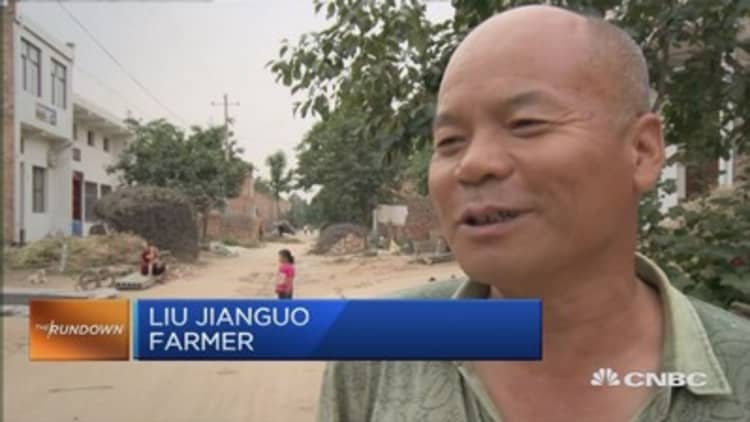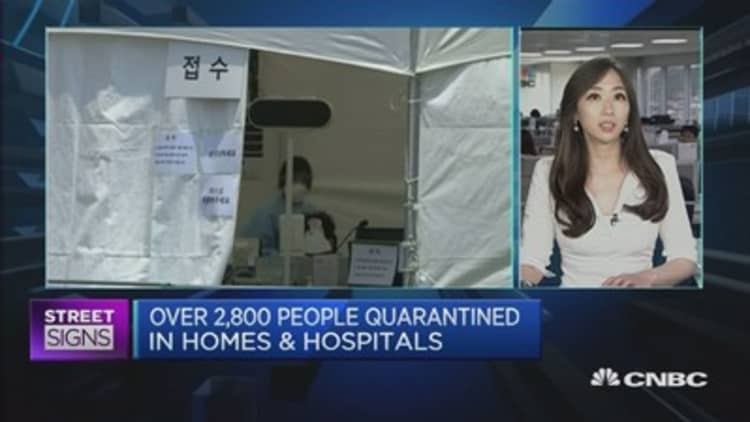The U.S. index provider MSCI's decision to delay the inclusion of mainland-listed A-shares in its emerging market index weighed on Chinese markets Wednesday, while the rest of Asia put up a mixed performance amid choppy trade.
Comments from Australia and Japan's central bank governors, compounded with the prospect of a September rate hike in the U.S., also tempered risk appetite in the region.
Overnight, U.S. stocks finished flat as investors eyed a recovery in bond yields and economic indicators that could shed light on the timing of a rate hike. The blue-chip Dow and the S&P 500 ended in neutral territory, while the Nasdaq Composite shed 0.15 percent.
Mainland markets down
China's benchmark Shanghai Composite index ended down 0.15 percent as investors expressed "modest disappointment" following the exclusion from one of the world's major equity indexes. Also weighing on sentiment was a report on the website of the People's Bank of China, which stated that the central bank's economists have lowered their 2015 growth forecast for the country to 7.0 percent from 7.1 percent.
After slumping 1.8 percent at the start of trade, the Shanghai bourse slowly clawed back losses to nudge above the flatline in the afternoon session, but failed to hold on to gains.
Some analysts think Wednesday's pullback may be a temporary blip. "Retail consumers are not going to stop [to think] about what MSCI is doing. They will keep forging ahead," Daniel Wiener, CEO of Adviser Investments, told CNBC.
Chris Weston, IG's chief market strategist, feels that recent declines may spark further policy easing. "The prospect of a pullback remains elevated in the Chinese markets, but given real yields are on the rise, I think we can expect a cut in benchmark interest rate or banks' reserve ratio requirements within the coming weeks, which means pullbacks in the mainland markets should be supported," he wrote in a note.
Attention was also on the market's largest initial public offering (IPO) since 2011. China National Nuclear Power Corporation (CNNPC) rocketed 44 percent to 4.880 yuan in its market debut, compared to its issue price of 3.39 yuan. As the company is the first nuclear power firm to go public on the A-share market, CNNPC has been in the spotlight since submitting its IPO application to the government.
Read MoreMSCI move to give China stocks a $400B boost
On Wednesday, the blue-chip CSI 300 index shed 0.16 percent, while the smaller Shenzhen Composite outshine with a 2 percent jump.
In Hong Kong, the Hang Seng index reversed direction to nosedive more than 1 percent to a two-month low as traders liquidated long positions in big H-shares such as Bank of China and China Construction Bank on the back of the MSCI' decision.
Shares of Hong Kong-listed HSBC extended losses to drop 0.7 percent following the British lender's announcement on Tuesday to cut costs by as much as $5 billion within two years and lay off as many as 25,000 staff. But, Sunrise Brokers' Asian Equities head Ben Collett told CNBC that he still likes the stock: "In Hong Kong, we like HSBC. We had a short squeeze yesterday, but we don't see much downside from here."

ASX adds 0.1%
Australia's S&P ASX 200 index bounced back into the black after an address by the Reserve Bank of Australia (RBA) governor Glenn Stevens indicated that the central bank was "open to the possibility" of more interest rate cuts if necessary.
Banking shares were mixed; National Australia Bank and Commonwealth Bank of Australia moved up 0.8 and 0.1 percent, respectively, while shares of Westpac stayed in the red with a 0.1 percent dip on news that it is splitting its most profitable retail and business banking division.
Iron ore prices steadying near four-month peaks failed to help mining heavyweights; Rio Tinto and Fortescue Metals fell 0.5 and 2.5 percent, respectively, while BHP Billiton notched up 0.3 percent.
Qantas Airways, which announced the addition of new flights in a bid to deepen its trans-pacific alliance with American Airlines, sagged 0.6 percent.
Retailers remained submerged below the flatline after the Westpac-Melbourne Institute consumer sentiment index tumbled 6.9 percent in June from 102.4 to 95.3. A figure above 100 indicates optimism, while a reading below 100 signals pessimism on current economic conditions and respondents' personal finances. Myer and Harvey Norman sank more than 2 percent each, while JB Hi-Fi receded 3.4 percent.
Read MoreAre Asia's markets facing a hike hissy?
Nikkei slips 0.3%
After holding up above the flatline for most of Wednesday, Japan's Nikkei 225 turned negative to end at its lowest level since May 19. This comes a day after the Tokyo index suffered its biggest loss in almost a month due to the prospect of an early U.S. interest rate hike.
Meanwhile, the yen shot up to a two-week high against the dollar, after Bank of Japan governor Haruhiko Kuroda said the real effective exchange rate shows the Japanese currency as "very weak".
As such, export-oriented stocks turned lower. NIntendo reversed course to edge down 0.2 percent despite news that Bank of America Merrill Lynch hiked its rating to 'neutral' from 'underperform.' Isuzu Motors and Hino Motors tumbled 2.9 and 3.7 percent, respectively, compounded by the fact that Citigroup downgraded the truck makers' rating to 'neutral' from 'buy'.
On the domestic data front, core machinery orders unexpectedly rose 3.8 percent in April, beating Reuters expectations for a 2.0 percent decline and following a 2.9 percent on-month rise in March. Machinery orders data are highly volatile and seen as a leading indicator of capital spending.

Kospi drops 0.6%
South Korea's Kospi index also erased initial gains to end in the red, as concerns over the country's Middle East Respiratory Syndrome (MERS) outbreak sapped risk appetite. The health ministry announced early Wednesday that two more people have died and reported 13 new cases of infections, bringing the total to 108.
Tourism-related counters were pummeled by worries that the disease would keep travelers, especially big-buying Chinese tourists, from visiting the country. Hanatour Service and Hotel Shilla retreated more than 2 percent each, while major retailers such as Hyundai Department Store and Shinsegae lost 2.7 and 1.9 percent, respectively.
Cosmetics maker AmorePacific and LG Household & Healthcare also tanked 2.1 and 4.7 percent, respectively.
After U.S. activist hedge fund Elliott said Tuesday it is seeking an injunction against Samsung C&T to block a proposed $8 billion takeover offer from Cheil Industries, shares of the former outperformed the bourse to jump 10 percent. Last week, Elliott said the deal is unfair and disclosed that it holds a 7.1 percent stake in the builder, making it the third largest shareholder of Samsung C&T.
Shares of Cheil Industries gave up gains to decline 2.2 percent.
SET rises 0.8%
Thailand's benchmark SET index recouped most of Tuesday's losses, while the Thai baht gained ground against the U.S. dollar after the Bank of Thailand kept its monetary policy on hold. The local currency strengthened 0.18 percent to trade at 33.64 against the greenback.

